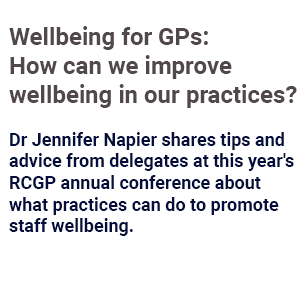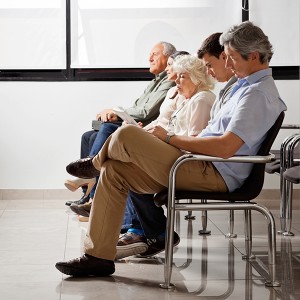At the RCGP conference in Harrogate earlier this year, I took part in a discussion about staff wellbeing with about 40 GP delegates.
The conversation emerged in response to two questions: ‘How can staff health and wellbeing contribute to practice resilience?’ and ‘What can practices do to protect and enhance staff health and wellbeing?’
The first question generated very little discussion. It was uncontroversial that staff health and wellbeing is intrinsically related to good patient care and practice effectiveness. It is linked to innovation, improvement, better reflection and learning, and working well as a team. It is part of a virtuous cycle – so health reinforces a positive work culture and vice versa.
The converse negative cycle was also discussed – poor health can lead to sickness absence or impaired effectiveness with a knock-on impact for patients and practice staff. With so little redundancy in the organisational systems of general practice, the possibility of a disastrous domino effect is never far away.
So in these tough times it is crucial that we – as practitioners, colleagues, employers and appraisers – seriously consider how we might improve health and wellbeing in our practices.
We all have a role to play
One of the issues raised in the conference discussion was that it can seem there is no point in admitting to problems when there is no visible support on offer. It was suggested we each have a role in ensuring our colleagues are aware of the sources of support available.
In my last article and my next article I am focusing on formal sources of support for doctors. You may know of other formal sources of support in your locality, including for other members of the team. And there are ways of promoting a culture of informally supporting staff within the practice, making it clear that wellbeing is on the practice agenda.
As we all shape our cultures, we can be part of the shift that normalises conversations around wellbeing and mutual support. Appraisers may have a particular role to play in opening up a discussion around how colleagues are coping. Indeed one participant mentioned that she asks her appraises to complete the burnout questionnaire on the Doctors for Doctors page of the BMA website.
Take time to do the basics
The main thrust of the conference conversation was that we really need to connect with one another as our main source of support at work. Coming together – whether specifically checking how we are doing, discussing work, getting to know one another, and even having a chance to laugh together – is crucially important to our wellbeing.
The basics are obvious, but can be lost in the daily grind: saying hello to colleagues when we arrive at work, goodbye when we leave and expressing gratitude for help in the course of the day.
Taking 10 minutes to have coffee or lunch together can make a huge difference to the working day of the practice. Some of our discussion at the conference focused on other ways of getting together – through journal clubs, walks or evenings out.
Practice managers can be an especially isolated member of the practice team, making it important to ensure they are connected up with a wider peer network to share ideas and gain support. A good practice manager is a lynch-pin for setting the atmosphere among practice staff, so ensuring they are coping and have good HR skills can be particularly important.
Within the constraints of contemporary general practice we have never needed collegial support more than we do now, and have never found it so hard to find the time for it. Good relationships are at the core of our wellbeing and resilience, so let’s find ways of reaching out and connecting
- Dr Jennifer Napier is a GP in London an honorary research fellow at Queen Mary, University of London where she has researched wellbeing and workforce issues. She is also the founder of Contextualyse, a consulting company focused on supporting organisations to create healthy workplace
This article first appeared on GPonline as part of its Wellbeing for GPs series. Read other articles in this series here.
Contact us to discuss how TrainingPrimaryCare can help your Practice, CCG or Federation. Telephone 0203 174 0888 or email support@thetrainingnet.com










